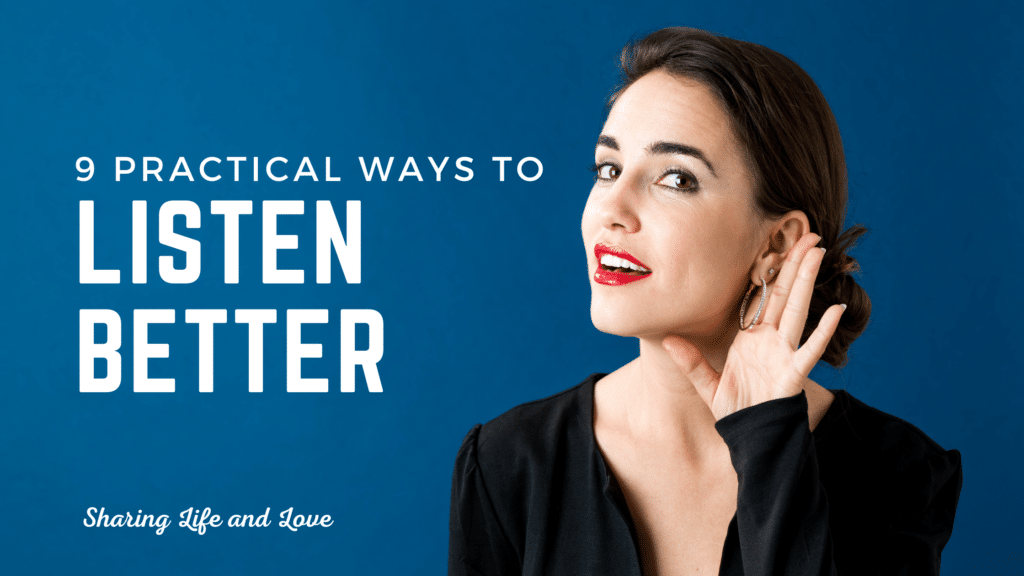Are you wondering how to improve your listening skills? Do you think there is room for improvement on the part of those who speak to you? Unfortunately, we generally cannot change other people or bend them to our will when hoping for effective communication.
That means that we must focus on ourselves and how we can become more effective in our communication. Listening is a fundamental skill in any type of communication. It even plays an important role in both personal and professional relationships.
Regardless of how skilled one believes they are at communication, the majority of people need to develop the proper art of effective listening. Most communicators today are poor listeners because they focus on their responses rather than understanding the speaker.
There is no reason to lose hope if you believe you have poor listening skills. In this article, we will look into the best ways to improve your listening skills and better your communication abilities. This will help you turn those boring conversations into stimulating chats!
When people talk, listen completely. Most people never listen. – Ernest Hemingway
This post may contain affiliate links. Please read our Privacy Policy for more information.
What is Active Listening?
Before we can discuss the reasons why listening is so important and how to improve your listening skills, we must understand the difference between active and passive listening. You might think they are the same thing, but in reality, they can change a conversation!
Active listening is an important listening skill that involves pure concentration, understanding, responding, and vividly remembering what you are being told. This shows that for one to be an active listener, one needs to have a focused and engaged approach to communication.
If you were speaking to a co-worker and they seemed disengaged, you’d likely want to stop the conversation quickly. You might even feel as if you were talking to a brick wall. The best way to engage others in important conversations is to learn the art of active listening.
Wisdom is the reward you get for a lifetime of listening when you’d have preferred to talk. – Doug Larson
The Importance of Listening
Did you know that 96% of listeners believe they are excellent at this skill? The reality is that only half of us retain what we hear. That means that we are not nearly as great as we think we are at this important communication skill.
Here are some reasons why improving your listening skills is important:
To build stronger relationships
Proper communication is key in any relationship. If you don’t believe you are heard, you’ll quickly quit talking. Healthy relationships are founded on active listening. When you genuinely listen to others, it fosters honesty, trust, empathy, and understanding with each other.
For better conflict resolution
Better listening skills also contribute to effective conflict resolution. When you are able to understand others’ opinions, you can navigate disagreements more effectively and find common ground more easily. Basically, you’ll get to the bottom of issues faster and with more clarity.
Improve your work performance
Effective listening is important for success in a professional setting, such as in your workplace. Through active listening, you can grasp complex information and enhance a better working relationship among your colleagues, clients, customers, and superiors.
Most of the successful people I’ve known are the ones who do more listening than talking. – Bernard Baruch
Facilitates personal growth
By listening actively to different viewpoints and feedback, you can easily facilitate your personal growth. Since listening attentively allows you to learn from different experiences, gain insights, and adapt to various situations, you will grow exponentially if you grasp this valuable skill well.

How to Improve Your Listening Skills (9 Ways)
If you want to know how to improve your listening skills, these 9 ways will surely jumpstart your journey. As you put each skill into practice, do not forget the reasons that you are hoping to master this skill. Keeping your purpose in mind will further your growth and this skill.
#1. Pay full attention.
Focus fully on the speaker by minimizing distractions and turning off your electronic devices. Another way to pay full attention is to maintain eye contact. By doing this effectively, you demonstrate a genuine interest in what the speaker is saying.
When someone is talking to you and fidgeting with their belt or checking their text messages at the same time, you probably do not feel as if they are fully listening to you. It is best to try to relate to what the speaker is saying in order to pay full attention to the subject matter.
Listening is being able to be changed by the other person. – Alan Alda
#2. Paraphrase and summarize.
Another way to improve your listening skills is to summarize or paraphrase what you have heard. One way to do this is to have a small notebook and a pen handy. This will allow you to record key points or summarize the speaker’s message to confirm your understanding.
Additionally, this will help you stay attentive, and in case of any questions you might have, you can refer to your notes to ask the speaker after they have finished talking. You can also record any key terms or phrases spoken so that you can repeat what you understood.
Make sure you use this method only if applicable to the situation. If the conversation is casual, you might wish to forgo the notebook and pen and just repeat the main points to the speaker. If you lack an understanding at any point, you could slightly raise your hand.
#3. Avoid Interrupting.
While understanding is critical when improving your listening skills, you’ll want to avoid interrupting if you can. As mentioned in the previous example, you might want to interrupt the flow of a casual chat if you are completely lost, but otherwise, try to wait.
It is courteous to allow the speaker to finish talking before responding with any comments, suggestions, or questions. Interrupting can disrupt the flow and show disinterest. If you’ve been interrupted in the past, you understand how annoying this can be when conversing.
From time to time, people will lose their train of thought if they are interrupted. If the person is affected by a mental health condition, they might not be able to retrieve the thought, or they might lose their train of thought more often than the average person.
Since we never know which type of person we are speaking to, it’s a good idea not to risk making someone lose their thought process by interrupting them. Of course, if needed or applicable, slight interruptions can be appropriate.
Everything in writing begins with language. Language begins with listening. – Jeanette Winterson
#4. Ask clarifying questions.
Once the speaker has finished talking, anyone can ask questions and seek clarification on anything that was not clearly pointed out. Asking open-ended questions encourages in-depth conversation and demonstrates a genuine interest in the speaker’s perspective.
In developing this habit, it’s a good idea to use the notebook in which you take diligent notes. You can ask the questions you recorded if you wrote any down, and you will be able to add other points that the speaker did not include if you have them recorded, as well.
#5. Practice silence.
Silence is a powerful tool in active listening. Allowing pauses in conversation allows the speaker to gather their thoughts and express themselves in an effective way. It also can show that you are interested in what they are saying.
This is not a skill that will develop itself or happen overnight. It only comes through practice. The next time that you are in a conversation with someone who has quite a bit to say, allow them to have the floor. Let them speak as long as they need to, paying close attention to the details.
There is as much wisdom in listening as there is in speaking – and that goes for all relationships, not just romantic ones. – Daniel Dae Kim
#6. Use non-verbal cues.
Body language is a means of communication. One needs to be mindful of their body language as it can either show boredom or interest. Displaying positive body language, such as nodding, enhances communication and shows active engagement.
If you are looking around the room or staring at the ceiling, you are giving clear non-verbal cues that you are not interested in what the speaker is saying. This type of behavior can come across as rude and arrogant. It is better to find an excuse to leave the conversation than to be impolite.

#7. Practice mindfulness.
Mindfulness is all about not focusing on the past or the future. You must be in the present. If you are worried about what someone said about you yesterday, you cannot fully listen to another person. Likewise, if you are fretting over the future, it’s hard to focus on the present.
To avoid any mental distractions, stay in the present moment. Exercises in mindfulness can greatly improve your overall focus and attentiveness. Mindfulness also polishes your effective listening skills as you aim to acquire new information in an uncluttered mind.
#8. Avoid judgment.
As we have seen above, developing good listening skills will help you with conflict resolution. If you hear the other person’s point of view with a clear head, you are more likely to de-escalate quickly and see their point of view with understanding and empathy.
For this reason, it’s always a good idea to approach conversations with an open mind. One example is to be aware of cultural differences that might influence communication styles. Don’t rush to judge someone when it could be an innocent misunderstanding.
The most important thing in communication is hearing what isn’t said. – Peter Drucker
#9. Offer feedback.
Another important listening skill is to provide constructive feedback. If you wish to voice your own opinion regarding what has been said, it’s crucial that you do so with tact and the other person’s dignity in mind. If you insult them, the conversation will end quickly.
By offering feedback, you are encouraging further dialogue and confirming your understanding. This reinforces the idea that you are listening to them. Of course, in an ideal situation, you are listening to them. The idea here is to demonstrate this fact by your response.
Most people do not listen with the intent to understand; they listen with the intent to reply. – Stephen R. Covey
How to Improve Your Listening Skills: Challenges and Solutions
As we have seen from the above practical techniques, active listening is a dynamic process that requires practice and conscious effort. No single technique will make you a listening expert, but with time and practice, you can certainly become quite skilled at this.
As you learn how to improve your listening skills, you’ll likely encounter a variety of situations. In each of the following scenarios, think of the challenge you would be facing if you were in the shoes of the listener. Then, imagine yourself using the suggested solution to remedy things.
Internal Distractions
Challenge: Personal or internal thoughts can cause you to derive your attention from the speaker, and the message they are conveying can become foggy or blurred by your own thoughts.
Solution: Try to practice mindful techniques or exercises to stay alert and show that you are attentively listening to what the speaker is saying to you.
External Distractions
Challenge: Apart from internal distractions, external distractions like outside noise or other conversations might hinder your effective listening skills.
Solution: If possible, choose a quiet environment. By doing this, you will create a more suitable atmosphere – one where distractions will be minimized.

Impatience
Challenge: Practicing patience is key to maintaining effective listening skills. A lack of patience might cause you to disrupt the speaker while he or she is talking and disrupt the entire flow of the conversation.
Solution: Exercise patience by allowing the speaker to finish talking. Once they have completed the portion they wish to share, you can express your thoughts.
Selective Listening
Challenge: At times, the topic in discussion might disinterest you. This could cause you to disregard certain aspects of the message that might or might not be important.
Solution: Try to put more effort into being more conscious and attentive to the topic in discussion. One can achieve this by practicing comprehensive listening, where you put words and ideas together in your head.
Assumptions
Challenge: Assuming that you have understood the whole conversation without trying to seek clarification leads to misunderstandings and assumptions that might be very incomplete.
Solution: For more effective listening skills, begin asking for clarification when things get foggy. Try to ask a question about what you do not understand. This might allow the speaker to expand on the subject, and it shows that you are paying attention enough to care about the meaning.

Prejudices
Challenge: Having preconceived ideas or incorrect opinions about someone affects how you listen to them.
Solution: Engage in the conversation without being biased. Try to actively understand diverse perspectives. Be around a variety of individuals to get a taste of different cultures, opinions, and thought patterns.
Lack of Proper Feedback
Challenge: Receiving limited feedback might prevent you from identifying areas for self-improvement. Likewise, not providing constructive feedback can show you are not practicing active listening.
Solution: Seek or observe feedback from others. You can seek feedback by asking people directly or observing how they respond to you as you talk. If your audience seems bored, be sure to ask engaging questions. Similarly, give feedback when listening to show understanding.
You cannot truly listen to anyone and do anything at the same time. – M. Scott Peck
Concluding Thoughts on How to Improve Your Listening Skills
You should now know how to improve your listening skills with a little bit of effort and a lot of practice. Keep in mind that effective listening requires continuous practice and effort. It does not just happen automatically. Listening skills must be continually improved upon.
However, with time, you will learn how to improve your listening skills. By improving your listening techniques and applying the above practical strategies, you will experience growth in both your personal and professional life.
This means that people will enjoy carrying on conversations with you and having you listen to them tell stories of their adventures and experiences. You will possibly be invited to more parties or gatherings. There’s also a good chance your popularity will grow.
We have two ears and one tongue, so we would listen more and talk less. – Diogenes



